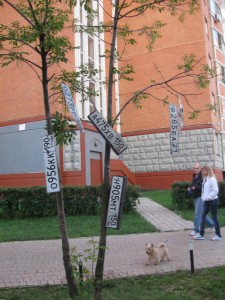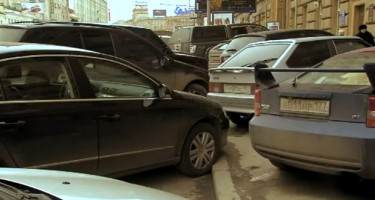Russian adventures and misadventures in parking could be a movie plot. The media often borrow and adapt the title of a popular film, “Peculiarities of National Hunting [1],” to express the craziness of the country’s parking situation.
But Russia’s parking problems are anything but comedy. Then-president Dmitriy Medvedev in 2010 called resolving traffic problems [2] [ru], including parking, a test of the authorities’ capacity. Relieving Moscow’s congestion, he said, was the key to solving other large problems, turning the capital into an international financial center, and fixing traffic in other large cities.
Moscow’s traffic and parking woes are byproducts of success, downsides to a rising car-purchasing consumer class, and inevitable growing pains of an old megapolis built for public transit, not the automobile. These problems should have been addressed, and were not, at least until recently.
How they do it
Moscow drivers are accustomed to parking on sidewalks, or the grass. They are used to parking illegally on streets, and blocking traffic or bus and tram stops. In neighborhoods, they block alleys into courtyards, and impede movement of emergency vehicles. Business owners, and even petty criminals, join the action by charging for parking on “their” sidewalks.
LiveJournal user Sergey Mukhamedov describes how illegal parking became the rule [4] [ru]:
Очень скоро мы привыкнем к этим новым условиям жизни в городе и перестанем задумываться о неправильной парковке. “Делать как все” – станет нормой. Сначала мы привыкли видеть, потом привыкнем делать так же.
In the past, Russia’s traffic police (the State Road Safety Inspectorate, or GIBDD) could not do much about illegal parking. They sometimes conducted enforcement “raids.” But citations had to be handed to car owners who were generally not deterred by small fines. Meanwhile, drivers defend themselves by arguing that Moscow’s buildings, apartments, and other infrastructure were built with little parking.
The numbers support them. Along with 11.5 million people, there are probably at least 3.5 million vehicles in Moscow, or about three for every 10 residents, according to most sources. In late 2010, the mayor’s office [5] [ru] reported the city had 920,000 parking spaces along with a deficit of some 2.3 million. That would amount to 3.2 million vehicles in Moscow.
It is not just Russia’s megapolis that suffers. Peripheral cities have parking problems that mimic those of Moscow or St. Petersburg. Their rate of car ownership is not far below that of the two largest cities.
How you modify behavior
LJ blogger Maxim Kats has plumbed the depths [6] [ru] of Moscow’s parking problems (as accurately as it is possible to do) and concludes:
[…] решать проблему пробок (в часности парковок) можно исключительно репрессивными мерами — нам нужно не увеличивать предложение дорог и парковок, а уменьшать на них спрос. Делать это можно только деньгами.
Kats believes solutions to Moscow’s parking problems are:
[…] возможно только тогда, когда из головы у людей вышла формула того, что ездить по городу свободно и парковать свою машину бесплатно в любом месте — это неотъемлемое право, а все эти знаки и запреты будто ерунда полная. Пока философия в голове такова, то никакого спроса на подземные паркинги, никакого спроса на хороший общественный транспорт не будет.
But Anton Nosik asks whether Moscow must really resort to repression [7] [ru]:
В очередной раз вместо строительства нормальных автостоянок и развития сети общественного транспорта пытаются решать проблему чисто репрессивными методами. Как будто бы под угрозой штрафов за неправильную парковку 5 миллионов легковых машин, ездящих по улицам Москвы, куда-то сами возьмут и улетучатся.
Other countries handle parking problems by different means, and so can Russia:
В самой по себе проблеме с парковками нет особенной московской специфики, потому что с ней сталкиваются мегаполисы в абсолютно любой части света. Но в цивилизованном мире эту проблему пытаются решать, создавая удобства для автомобилистов, решивших поменьше ездить по городу. И, конечно же, для решения проблемы с парковкой строят и оборудуют автостоянки в таких местах, где они не мешают дорожному движению. А у нас власти умеют создавать гражданам только неудобства. Им даже в голову не приходит, что есть какой-то другой способ взаимодействия с населением.
Higher fines to discourage illegal parking
Administrative code changes conceived by the government became reality on July 1, when stiff penalties for moving violations and illegal parking took effect. The price of a parking ticket in Moscow and St. Petersburg rose overnight from a nominal 300 rubles to as much as 3,000. The changes also included a heftier impound fee, and the authorities announced they would be towing more vehicles. At the same time, the government promised more public parking would be made available in Moscow.
Russians seem of two minds. Some say car owners never should have expected to park right outside their offices or apartments for free. Drivers worry about spending their salaries to park in the center of Moscow. A few media outlets suggest big tickets could become a windfall for corrupt city bureaucrats or police.
But the new fines do not seem to be biting too deeply, at least not yet. Moscow’s traffic remains in the late summer lull. The real impact may not be known until Muscovites return to their usual routines in coming weeks.
Citizens also respond
Ordinary citizens have never waited passively for the government to respond to illegal parking. They have a tradition of rather direct action against compatriots who do not follow the rules.
The most radical, and aggressive, is “repainting” an offending vehicle. In a case from Novgorod, made famous by photographs ubiquitously shared online, a man painted a gray BMW pink, after it was parked illegally on the sidewalk.
 [8]
[8]Free detailing for a driver who blocked his neighbors. The graffiti reads, “FOOL.” 1 March 2011, screenshot from YouTube video.
It is also common to see signs warning drivers not to park in certain places under the threat of getting a shovel through the windshield.
In 2010, the pro-Kremlin group Nashi, operating under the STOPBOORS (СТОПХАМЫ) name, pasted large stickers saying, “I SPIT ON EVERYONE I PARK WHERE I WANT” (МНЕ ПЛЕВАТЬ НА ВСЕХ ПАРКУЮСЬ ГДЕ ХОЧУ) on violators's windshields in Moscow. The action led to more than a few semi-physical confrontations with offending drivers. (The website o001oo.ru [9] [ru] has videos of STOPBOORS in action.)
 [10]
[10]Anonymous photograph of the license plates of cars that blocked the alley in Balashikha, Russia. (Widely circulated online. Specific date unknown.)
But Russians also employ more subtle methods. On LJ, for instance, user dimka-jd shared a photograph of the license plates of cars that blocked the alley of a Balashikha building hanging from a tree [10] [ru]. (See photo to the right.)
Technology and social media play their part in the citizen response. Moscow online paper the-village.ru [11] [ru] has developed a smartphone app to name and shame offenders, called “Parking Douche.”
With this app, anyone can photograph an illegally parked vehicle, and a picture of the car and its license plate appear as banner ads for Internet users with IP addresses near the “parking douche.” To remove the ad, users simply need to share the post on social media, spreading the word about (and shaming) inconsiderate drivers.
Are there peculiarities?
When it comes to parking, is Russia a special case? In some ways, Russian reactions to illegal parking are like those of any people facing such conditions. But in others, they seem uniquely Russian.
Like other problems, Russia’s parking problem has accumulated for 20 years, awaiting some kind of solution. Observers debate whether Russians will respond to repression or reason, and are seemingly divided over confrontation or a more creative, civil approach. One could be describing politics just as easily as parking.
President Vladimir Putin recently indicated that Moscow’s parking dilemmas will not be going away soon [12] [ru]:
Почти половина рабочих мест сосредоточена в пределах Третьего транспортного кольца, а проживает здесь только 8 процентов населения. Между Третьим кольцом и МКАД живут 92 процента москвичей. Ещё 1 миллион 300 тысяч ежедневно приезжают работать из Московской области.
It remains to be seen how vigorously Moscow will deal with illegal parking. If it succeeds, its methods could show what kind of transportation system and cities Russia will have — and even what kind of country it will be.
